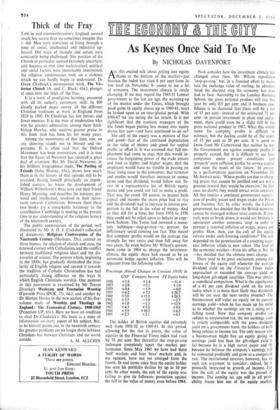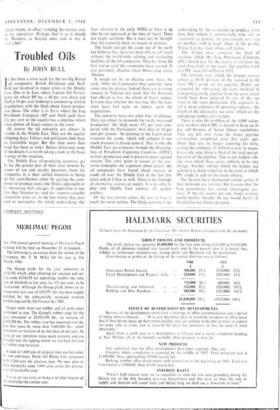As Keynes Once Said To Me
JL marm '141U 00.17
By NICHOLAS DAVENPORT
The cult of the equity was a mixture of fear and greed-fear of the continued depreciation in the value of money and greed for capital profits to offset it. It was assumed that full em- ployment had come to stay, that this would in- crease the bargaining power of the trade unions and lead to higher and higher wages, that the employers would have no trouble in passing on these rising costs to the consumer, that turnover and profits would therefore increase in money terms and that dividends would' follow suit. In- vest in a representative list of British equity shares and you could not fail to make a profit. That was the creed. Of course, to protect both capital and income the share price had to rise and the dividends had to increase in inverse pro- portion to the fall in the value of money. And so they did for a time, but from 1955 to 1956 they could not be relied upon to behave in copy- book fashion. The Tories had invented a mone- tary technique-stop-go-stop-to prevent the inflationary spiral running too fast. This meant that company profits would on the average rise strongly for two years and then fall away for two years. So even before Mr Wilson's govern- ment came in 1964 to change the investment climate, the equity share had ceased to be an automatic hedge against inflation. This will be apparent from the following table:
Percentage Annual Changes in Constant (1958) is
GNP Company Income FT Equity Index
1956 +1.9 +1.4 -11.4 1957 +2.0 +2.1 +1.0 1958 +0.4 -1.9 -6.0 1959 +4.2 +7.5 +36.7 1960 +5.0 +11.1 +26.3 1961 +3.5 -1.0 -2.5 1962 +1.0 -1.3 -13.9 1963 +4.3 +82 +9.8 1964 +5.9 +10.5 +6.5 1965 +2.3 +2.1 +0.5 The holder of British equities did extremely well from 1951-52 to 1960-61. In this period, allowing for the rise in prices, the value of equities in the Financial Times index had risen by 76 per cent. But thereafter the stop-go-stop technique completely upset the market per- formance. Since May 1961 we have had three `bull' markets and four 'bear' markets and, in my opinion, have not yet emerged from the fourth. In real terms since then the equity holder has seen his portfolio decline by up to 10 per cent. In other words, the cult of the equity was failing to give its followers protection against the fall in the value of money even before 1964. Now consider how the investment climate has changed since then. Mr. Wilson repudiated `stop-go-stop,' but, in a frenzied effort to main- tain the exchange value of sterling, he adminis- tered the sharpest stop the economy has ever had to face. According to the London Business School, the gross national product will rise this year by only 0.5 per cent and if business con- fidence is so shattered that there will be a cut of 15 per cent-instead of the estimated 74- per cent-in private investment in plant and equip- ment, there could even be a slight fall in the gross national product in 1967. What this would mean for company profits is difficult to estimate, but the decline could be of the order of 15 per cent to 20 per cent. It is good to know from Mr Catherwood that neither he nor the Government are against company profits if properly earned, but it is difficult to see how companies under present conditions can `properly' earn sufficient profits 'to service capital and meet the needs of the future.' In answer to a parliamentary question on November 26, Mr Stewart said: 'Where profits are due to charg- ing prices that cannot be justified and are not a genuine reward they would be excessive.' In that case, no doubt, they would attract extra taxation. All this implies a continual government supervi- sion of profits, prices and wages under the Prices and Incomes Act. In other words, the Labour government has decided that the British economy cannot be managed without strict controls. If con- trols were to break down, it would not hesitate to administer another economic 'stop' in order to prevent a renewed inflation of wages, prices and profits. How, then, can the cult of the equity survive under such freezing conditions? The cult depended on the perpetuation of a creeping wage- cost inflation which is now taboo. The lord of the economic weather-from his office at No. 10 has decided that the climate must change.
There used to be great excitement among fol- lowers of the equity cult whenever the average dividend yield on the Financial Times index approached or exceeded the average yield on long-dated gilt-edged securities. This was always a superficial comparison. What is the significance of a 6+ per cent dividend yield on the index today when it is more than likely that dividends will be cut over the next twelve months? The businessman will value an equity on its current earnings yield-when he has made up his mind as to whether the earnings are on a rising or a falling trend. Now that company profits are subject to corporation tax, the net earnings yield is strictly comparable with the gross dividend yield on a government bond, the holders of both being subject to income tax. The only reason why a businessman might buy an equity giving an earnings yield less than the gilt-edged yield is (a) because he is a high surtax payer and (b) because he believes the company's earnings will be reinvested profitably and grow at a compound rate. The institutional investor, however, has no such tax argument to consider; indeed, he is primarily interested in growth of income. For him the cult of the equity was the pursuit of income. The coming ice age will in all prob- ability freeze him out of the equity market, which means, in effect, handing the market over to the speculator. Perhaps that is as it should he. Business, as Keynes once said to me, is 'iust a bet.'



































 Previous page
Previous page